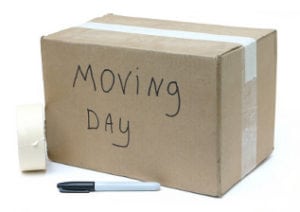
In all the excitement of moving and trying to get settled in the new home, the last thing you want is a honey-do list, right? Some things, however, shouldn’t be put off but need to be taken care of now.
So, push the boxes aside for a day or two and let’s get ‘er done!
1. Change the locks
Although this may seem like a no-brainer, changing the door locks on a new home is something many homebuyers neglect doing. Hey, when you consider all the little details that need attention, such as changing over the utilities, registering the kids in new schools and ensuring everyone has your new address, something is bound to fall through the cracks.
Since you don’t know exactly how many people have keys to the home and who they are, put this one at the top of your to-do list.
Unless you’re opting for a smart lock, changing the locks on a door is a common DIY project and costs very little.
2. Locate your home’s main water shutoff valve
Scrambling to figure out how to shut off the water in your new home wastes precious time in an emergency. Scout out the location of your main water shutoff valve now and share the location with other household members.
Unfortunately, there are a number of places that it could be located. In cold-climate areas you’ll typically find the water shutoff valve somewhere indoors, such as in the basement. In warmer weather regions it may be located outdoors or in the garage. If the home is on a slab foundation, check for the valve near the water heater.
3. Secure your home purchase paperwork
Before putting away all those documents you signed at closing, make copies of them and store them in a safe place, off-site. No, you may not need to refer to this paperwork, but then again, you may, so it’s a good idea to keep everything.
While you’re in the paperwork groove, consider purchasing an accordion file and use it to hold all the paperwork you’ll accumulate as a homeowner. This includes receipts for repairs and improvements, insurance information and warranties.
When it comes time to sell the home, you’ll be glad you have all of this important information in one place.
4. Open a new savings account
Yes, you paid a whole lot of money at the closing table, but that was just the beginning of what it costs to own a home. Routine maintenance and emergency repairs need to be factored in as well.
“No new homeowner, myself included, can ever feel fully prepared for the maintenance costs and renovation costs associated with homeownership,” Pamela Capalad, a Brooklyn NY financial planner tells NerdWallet.com.
But a savings account, dedicated specifically to pay for home maintenance and repairs can go a long way toward being prepared.
Most financial experts say to set aside 1 to 2 percent of the home’s value each year for both maintenance and repairs. For example, if your home is worth $250,000, you should dedicate from $2,500 to $5,000 a year.
Make it less painful by having a monthly amount (from about $210 to $420) automatically deducted from your pay and sent to the dedicated savings account.
Deferring routine maintenance may impact your home’s future value, by the way.
5. Replace your air filters
Changing an old HVAC filter just one time is enough to convince many of us to make changing them a routine. Sadly, that isn’t the case. Many homeowners neglect this inexpensive and easy home maintenance chore and end up breathing in that brown fuzz that clings to old filters.
Not only that, but they’re setting the entire system up for failure. “A system that has a dirty filter can suffer from pressure drop, which can lead to reduced air flow, or ‘blow-out,’ resulting in no air infiltration at all,” according to Nick Gromicko and Kate Tarasenko for the International Association of Certified Home Inspectors (InterNACHI).
Change the filter in a busy household with kids and pets once a month, otherwise, you may be able to wait three months before installing a new one. Learn how to change the filter at thefamilyhandyman.com. Or my favorite place to learn www.YouTube.com





